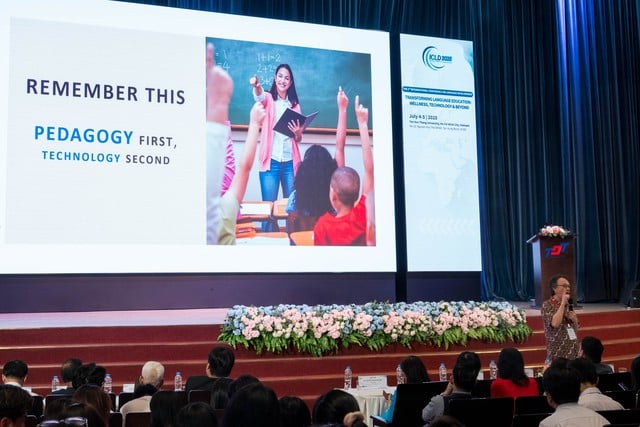
Teachers are advised to prioritize pedagogical methods first, then consider technological factors.
PHOTO: NGOC LONG
On the morning of April 7th, Ton Duc Thang University in Ho Chi Minh City (comprising Ho Chi Minh City, Ba Ria-Vung Tau province, and the former Binh Duong province) collaborated with Shanghai Normal University (China), Silpakorn University (Thailand), and Nueva Vizcaya State University (Philippines) to co-organize the 2nd International Conference on Language Development (ICLD) with the theme "Transforming Language Education: Health, Technology, and Other Issues". The conference attracted many experts, scientists, and lecturers from Vietnam and around the world to present papers.
Technology will be useful if...
At the event, Dr. Willy A. Renandya, a senior lecturer at the National Institute of Education (NIE) of Nanyang Technological University (Singapore), and a visiting professor at Chulalongkorn University (Thailand) and Wuhan University (China), frankly stated that simply using technology does not necessarily improve students' foreign language skills, whether it's English, Chinese, or any other language. This conclusion was drawn from numerous studies.
Specifically, research by Guofang Li (Canada) and colleagues showed no significant difference in attracting students to learn a foreign language between groups of teachers who used a lot of technology and those who used little technology. Meanwhile, in the work of Ewa M. Golonka (USA) and colleagues, the results of reviewing 350 studies assessing the impact of technology on language proficiency development indicated that, while technology is useful for teaching and learning, its impact is very small, almost negligible.
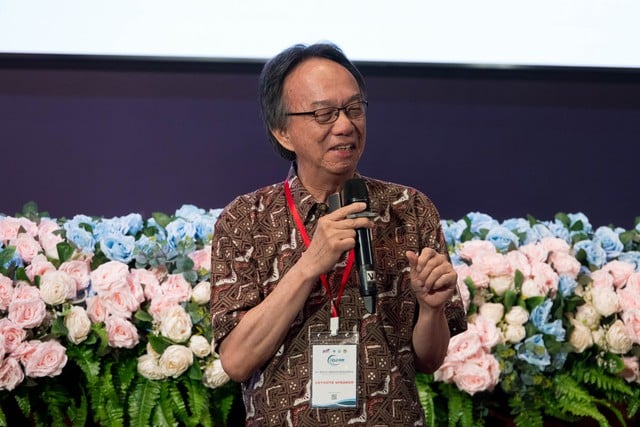
Dr. Willy A. Renandya, a highly experienced expert in English language teaching in Southeast Asia.
PHOTO: NGOC LONG
"If we use technology, one aspect it most noticeably supports is pronunciation. This is because pronunciation is the smallest aspect of language learning, and today's technology does a good job of this. You can use speech recognition software to practice pronunciation and receive immediate feedback, then practice repeatedly. But with other skills like reading, writing, and speaking, the reality is not as good as expected," shared Dr. Renandya.
"So, can technology positively impact language learning? The answer is probably no, at least not at the moment," the education expert stated.
Mr. Renandya also pointed out that in many cases, technology is used because it is readily available, or because school leaders require it. For example, instead of teaching with a blackboard and chalk, teachers use software for presentations, or instead of handing out paper tests, they use supporting applications like Google Forms. "These applications essentially don't change anything in terms of pedagogical methods," he analyzed.
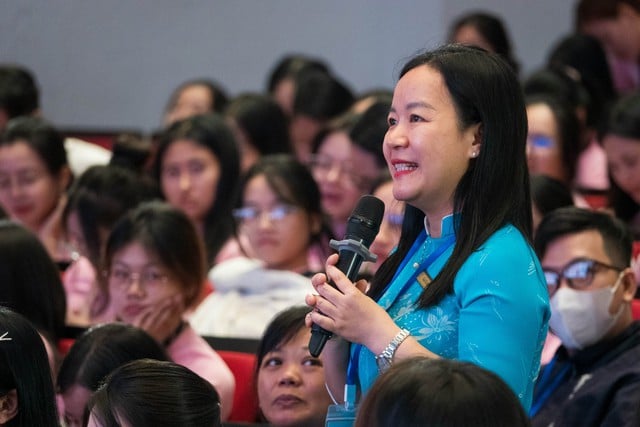
Attendees asked questions to the speaker.
PHOTO: NGOC LONG
That's also why Dr. Renandya advises teachers to focus on improving their teaching methods first before resorting to technology, recommending that they apply five general educational principles: personalized teaching; engaged learning (engaging 90% of students in 90% of the lesson time); authentic learning (through practical activities rather than just theoretical teaching from textbooks); feedback; and collaborative learning.
"Technology is certainly important; it will change the way we teach. But will technology help students become better at English? The answer is yes, only if teachers combine two elements: general educational principles, and more importantly, principles of second language acquisition," Renandya noted.
In an interview with Thanh Nien newspaper , Dr. Willy A. Renandya shared that there are currently many technological tools available, and "new tools appear almost every day." However, teachers don't need to learn how to use all of them; they should only choose about five main tools that are easy to use for both teachers and students. "Don't feel overwhelmed; choose the tools that are truly useful to you," Dr. Renandya advised.
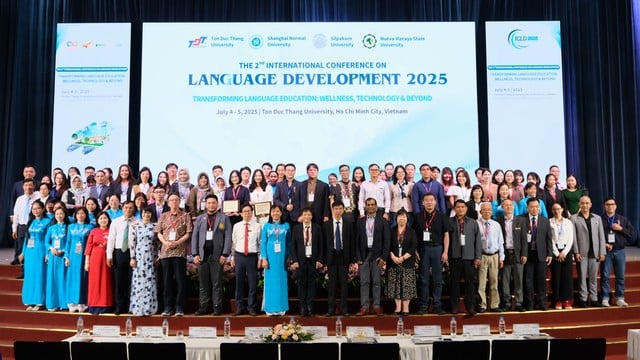
Delegates from both within and outside the country attended the workshop.
PHOTO: NGOC LONG
AI is a "double-edged sword".
In China, starting in the 2025-2026 school year, primary and secondary schools in Beijing will incorporate AI courses into their curricula, aligning with the long-standing trend of implementing AI training programs at the university level. In these AI lessons, Chinese students will not only learn how to use AI chatbots like DeepSeek and related tools, but also explore fundamental AI concepts and ethical considerations when using AI.
"China has been, and continues to be, interested in developing and applying AI technology. To date, many AI software programs have become popular and widely used, such as Doubao, DeepSeek, and Wenxin Yiyan... Many schools also rely on AI to support teaching, and AI has truly helped improve the effectiveness of teaching and learning in the classroom," Professor Cao Xiuling, Director of the International Chinese Language Institute at Shanghai Normal University, shared with Thanh Nien newspaper .
However, Ms. Cao also argued that AI is like a "double-edged sword," offering many benefits but also creating numerous new problems for both teachers and students, particularly those related to AI ethics such as user data security, fairness in education, and creative thinking.
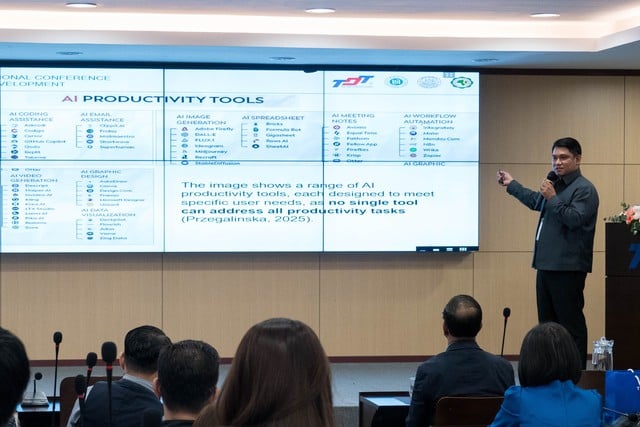
Associate Professor William D. Magday Jr., Dean of the School of Education at Nueva Vizcaya State University, presented several AI tools that can assist teachers and students.
PHOTO: NGOC LONG
Associate Professor William D. Magday Jr., Dean of the School of Education at Nueva Vizcaya State University, shares this view. To ensure privacy and data security, he noted that the Philippines currently has the Data Protection Act of 2012, which requires teachers to be responsible for protecting students' privacy and data security when allowing them to use AI tools in the classroom, thus avoiding potential risks.
Furthermore, education experts also note that teachers must minimize bias in AI to ensure fairness in language teaching and learning. Because AI algorithms are trained on existing data, and if that data reflects social biases regarding gender, race, socioeconomic status, etc., the AI will repeat those biases in evaluating students' work.
There have been cases where students received low marks for mentioning phrases like "single mother" or "barangay captain" (a leader at the smallest administrative unit in the Philippines), while receiving high marks for using phrases like "global company CEO" or the names of Western figures, Professor Magday cited as an example. "AI has absolutely no emotions, so it cannot explain the context of the student's answer," he warned.
Source: https://thanhnien.vn/dung-cong-nghe-de-day-tieng-anh-chua-chac-giup-hoc-sinh-gioi-hon-18525070419594192.htm


![[Photo] Prime Minister Pham Minh Chinh receives Lao Minister of Education and Sports Thongsalith Mangnormek](/_next/image?url=https%3A%2F%2Fvphoto.vietnam.vn%2Fthumb%2F1200x675%2Fvietnam%2Fresource%2FIMAGE%2F2025%2F12%2F16%2F1765876834721_dsc-7519-jpg.webp&w=3840&q=75)
![[Image] Leaked images ahead of the 2025 Community Action Awards gala.](/_next/image?url=https%3A%2F%2Fvphoto.vietnam.vn%2Fthumb%2F1200x675%2Fvietnam%2Fresource%2FIMAGE%2F2025%2F12%2F16%2F1765882828720_ndo_br_thiet-ke-chua-co-ten-45-png.webp&w=3840&q=75)
![[Live] 2025 Community Action Awards Gala](/_next/image?url=https%3A%2F%2Fvphoto.vietnam.vn%2Fthumb%2F1200x675%2Fvietnam%2Fresource%2FIMAGE%2F2025%2F12%2F16%2F1765899631650_ndo_tr_z7334013144784-9f9fe10a6d63584c85aff40f2957c250-jpg.webp&w=3840&q=75)


![[Photo] Prime Minister Pham Minh Chinh receives the Governor of Tochigi Province (Japan)](/_next/image?url=https%3A%2F%2Fvphoto.vietnam.vn%2Fthumb%2F1200x675%2Fvietnam%2Fresource%2FIMAGE%2F2025%2F12%2F16%2F1765892133176_dsc-8082-6425-jpg.webp&w=3840&q=75)
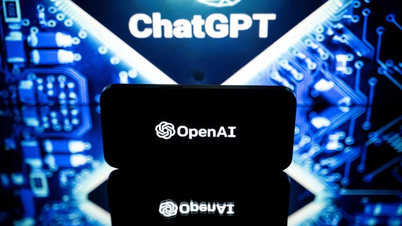





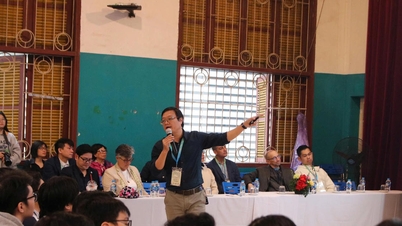

































































































Comment (0)